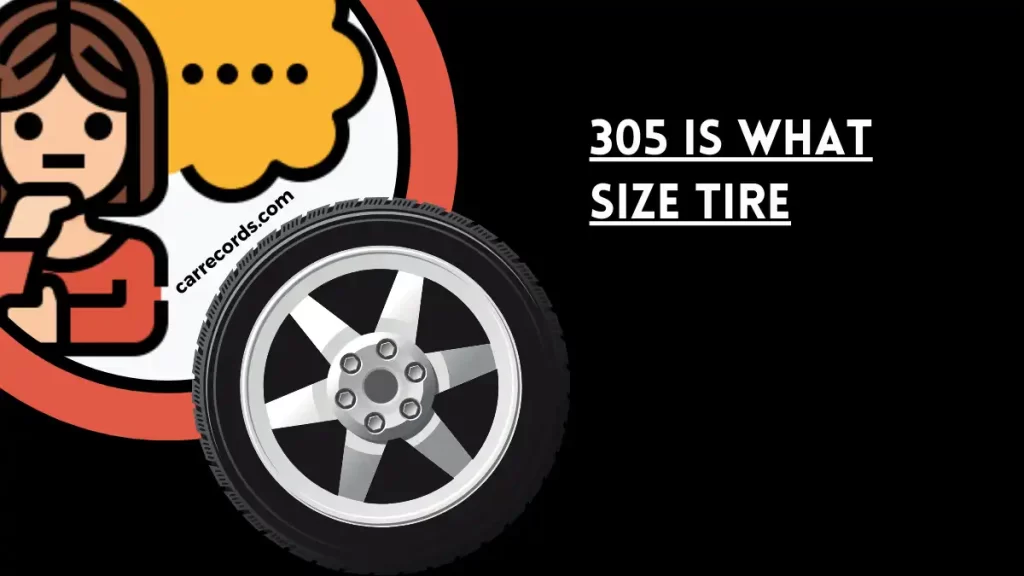✔️ 305 is what size tire ?
The 305 tire size refers to a tire that is approximately 305mm wide, which translates to around 12 inches. This measurement corresponds to the distance between the inside and outside sidewalls of the tire.
Tire size is a crucial factor in determining a vehicle’s performance, stability, and overall driving experience. Among the various tire sizes available, the 305 tire size stands out due to its impressive dimensions and unique features,
Whether you’re a car enthusiast seeking to upgrade your vehicle’s performance or a casual driver looking for the best fit, this article will provide you with the information you need to make an informed decision.
Understanding Tire Size: Factors to Consider
Selecting the right tire size involves considering multiple factors that directly influence your vehicle’s performance and handling. The make and model of your vehicle play a significant role in determining the appropriate tire size.
Vehicles with larger engines might require wider tires to accommodate the power and torque they generate. Additionally, the terrain you’ll be driving on is a critical factor. Smoother roads might demand smaller tires, while rugged terrains necessitate wider and sturdier options. The diameter of your wheel also dictates the tire size, with larger rims requiring larger tires.

Decoding the 305 Tire Size
The 305 tire size, often referred to as a 305/35R20 tire, is a substantial tire designed to cater to specific needs. The “305” in the tire size refers to the width of the tire in millimeters, which is approximately 12 inches.
This width provides ample contact with the road surface, enhancing grip and stability. The “35” represents the aspect ratio, indicating the tire’s height as a percentage of its width. In this case, the tire’s height is 35% of its width. The “R20” denotes that the tire is designed to fit a rim with a diameter of 20 inches.
Benefits of the 305 Tire Size
Using the 305 tire size offers a range of benefits that can significantly impact your driving experience. The robust tread pattern of this tire enhances traction and grip on various road surfaces, contributing to safer driving. The increased width of the tire provides better stability, particularly during cornering and high-speed maneuvers.
If you own a larger vehicle or frequently carry heavy loads, the 305 tire size can effectively distribute the weight and improve overall stability. Additionally, these tires offer improved load-bearing capacity, making them ideal for commercial and heavy-duty vehicles.
Enhanced Traction and Stability
One of the standout advantages of the 305 tire size is its superior traction. The wider surface area in contact with the road increases the tire’s frictional coefficient, translating to enhanced grip.
This is particularly beneficial in wet or slippery conditions, as the tire can effectively channel water away, reducing the risk of hydroplaning. Furthermore, the wider tire contributes to greater stability, as the increased contact patch ensures better weight distribution. This results in improved handling and a smoother ride.
Durability and Load-Bearing Capacity
The robust construction of the 305 tire size makes it more durable compared to narrower tires. The added strength and sturdiness allow the tire to bear heavier loads without compromising performance. Whether you’re towing a trailer, carrying heavy cargo, or driving a larger vehicle, the 305 tire size can handle the pressure. This durability ensures longevity and minimizes the risk of tire damage due to excessive weight.
Drawbacks of the 305 Tire Size
While the 305 tire size offers numerous advantages, it’s essential to acknowledge its drawbacks as well. The broader size of these tires can negatively impact fuel efficiency, as the increased friction requires more energy to move the vehicle. Additionally, the unique design and construction of 305 tires contribute to their higher cost. These tires are often specialized for performance vehicles and crafted using advanced materials, making them pricier compared to standard options.
Impact on Fuel Efficiency
The larger size of the 305 tire leads to higher rolling resistance, meaning more effort is required to move the vehicle. This additional effort translates to reduced fuel efficiency, as the engine needs to work harder to overcome the increased friction. If fuel economy is a primary concern, it’s crucial to weigh the benefits of improved performance and stability against the potential dip in fuel efficiency.
Cost Considerations
305 tires are relatively less common and are often designed for performance-oriented vehicles. The specialized construction and materials used in these tires contribute to their higher cost. If you’re considering switching to 305 tires, it’s essential to factor in the initial investment as well as the potential long-term savings in terms of enhanced performance and durability.
Frequently Asked Questions
How Big Is a 305 Tire?
The total diameter of a 305 tire is around 33.21 inches. Most 305 tires are compatible with rims that have a diameter of 16 inches.
How Much Bigger Are 305 Tires Than 275 Tires?
A 305 tire is wider and taller than a 275 tire. The height difference between these two sizes can range from approximately 0.77 to 0.83 inches. Keep in mind that even a slight difference in tire size can affect your vehicle’s handling and performance.
Conclusion
In the realm of tire sizes, the 305 tire size stands out for its unique characteristics and performance-enhancing features. As we’ve explored in this article, the benefits of the 305 tire size encompass improved traction, stability, and load-bearing capacity. These advantages make it a compelling choice for those seeking enhanced driving experiences, especially in larger or performance-oriented vehicles.
